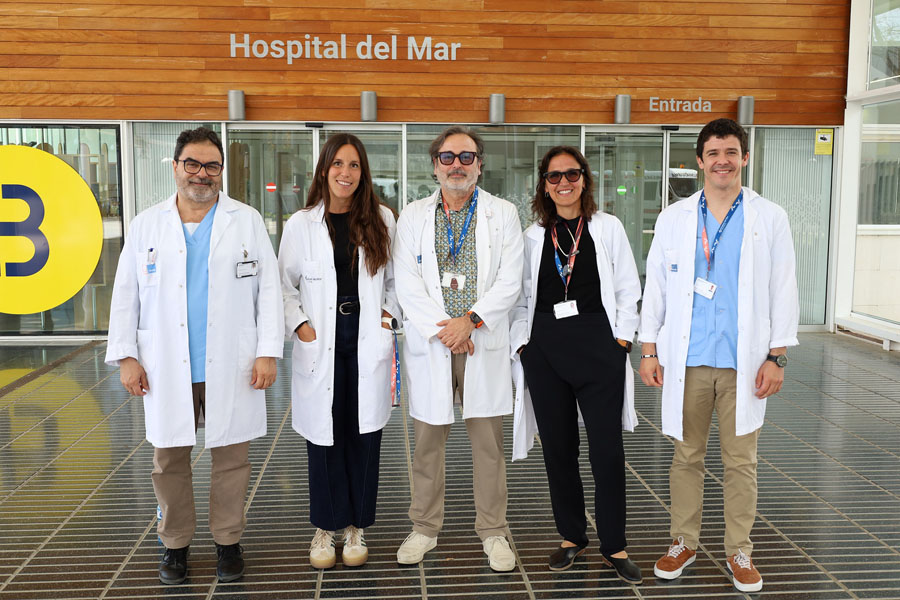
20/05/2025 - Press release
A study from the Hospital del Mar, the Hospital del Mar Research Institute, and the Reference Laboratory of Catalonia validates the effectiveness of combining a molecule, apotransferrin, with existing antibiotics to treat the antibiotic-resistant bacteria Pseudomonas aeruginosa.
The research, published in the International Journal of Antimicrobial Agents, opens the door to a new strategy for tackling the problem of antibiotic-resistant bacteria by preventing them from accessing the iron they need to complete their life cycle.
The new drug combination enhances the ability of antibiotics. Additionally, apotransferrin is a drug already used in other diseases, which could facilitate its use in bacterial infections.
A study from the Hospital del Mar and researchers from its research institute may open a new avenue for tools against antibiotic-resistant bacteria. The research, published in the International Journal of Antimicrobial Agents, evaluated the effectiveness of a new drug combination to treat Pseudomonas aeruginosa infections resistant to treatment with antibiotics. This is one of the most common bacteria in hospitals. The study involved collaboration with Hospital Son Espases in Palma, Mallorca, the Reference Laboratory of Catalonia, which is part of the dibi network, and researchers from the CIBER Infectious Diseases Area (CIBERINFEC).
The researchers analyzed the ability of a molecule, apotransferrin, to deny the bacteria the iron it needs to complete its life cycle, grow, and reproduce. They tested it both alone and in combination with relatively new antibiotics, such as ceftolozane/tazobactam. It's worth noting that, although these antibiotics have been on the market for less than 10 years, 30% of Pseudomonas aeruginosa infections have already developed resistance to this treatment.

From left to right: Juan Pablo Horcajada, Sandra Domene-Ochoa, Eduardo Padilla, Milagro Montero, Daniel Echeverria-Esnal.
Better Combined
"What we have observed is that the use of apotransferrin strengthens the action of the antibiotic," explains Dr. Milagro Montero, head of the Infectious Diseases Department at the Hospital del Mar and a researcher at the Hospital del Mar Research Institute and CIBERINFEC. To do this, the researchers used Pseudomonas aeruginosa samples from real patients in nine hospitals across Spain. In an in vitro study, the effectiveness of apotransferrin alone or combined with antibiotics and different concentrations of the molecule was tested, concluding that the best option was to administer it alongside the antibiotic ceftolozane/tazobactam. On its own, the molecule was not useful for reducing bacterial concentrations.
The success is attributed to apotransferrin's ability to sequester the iron the bacteria need. The fact that it is not an antibiotic reinforces the appeal of this approach. "This is an inevitable path, as the failure of antibiotics parallels their commercialization. The ability of bacteria to develop resistance to antibiotics is parallel to the use of these drugs," says Dr. Montero. The use of this molecule strengthens the antibacterial capacity of antibiotics.
The fact that apotransferrin is already used to treat other conditions in hematology, neurology, and ophthalmology, among others, and that safe doses for patients are known, makes researchers confident in its safety for use in infections. "We ensured that the concentration of apotransferrin used is the same as that used in clinical settings for other conditions, with prior safety studies backing the concentration we used," explains Sandra Domene-Ochoa, researcher at the Hospital del Mar Research Institute.
This is the first time the application of this molecule against antibiotic-resistant bacteria has been analyzed. The research team intends to consider conducting a randomized clinical trial with real patients in the future to certify the results obtained and open the door to its use as a new therapeutic strategy.
Reference article:
Montero MM, Domene-Ochoa S, Prim N, López-Causapé C, Echeverria-Esnal D, Sorlí L, Luque S, Padilla E, Grau S, Oliver A, Horcajada JP. Pharmacodynamic interaction of apotransferrin and anti-pseudomonal antibiotics against extensively drug-resistant Pseudomonas aeruginosa in a dynamic PK/PD model. Int J Antimicrob Agents. 2025 Feb 28;65(5):107477. doi: 10.1016/j.ijantimicag.2025.107477. Epub ahead of print. PMID: 40024605.
Servei de Comunicació:
Marta Calsina(ELIMINAR)
Tel:
(+34) 93 316 06 80
Doctor Aiguader, 88
08226 Barcelona
© Institut Hospital del Mar
d'Investigacions MèdiquesLegal Notice and Privacy Policy | Cookie Policy | Site Index | Accessibility | Find Us | Contact